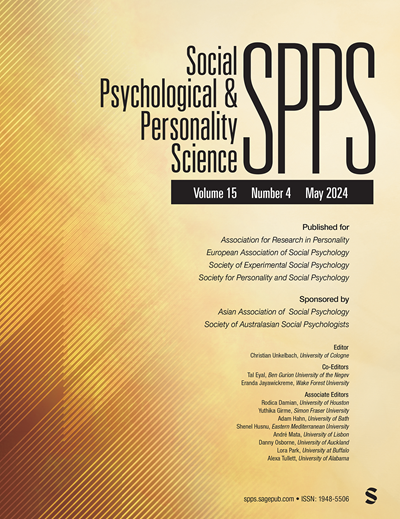Does Emotion Regulation Flexibility Work? Investigating the Effectiveness of Regulatory Selection Flexibility in Managing Negative Affect
IF 3.3
2区 心理学
Q1 PSYCHOLOGY, SOCIAL
引用次数: 0
Abstract
Regulatory selection flexibility—the ability to flexibly choose emotion regulation strategies that are appropriate to dynamic contextual demands—has been theorized as a critical component of adaptive emotional functioning. Despite this, little research has investigated whether individual differences in regulatory selection flexibility influence real-time emotional experiences. The current study aimed to test the effectiveness of regulatory selection flexibility in reducing negative affect while exposed to emotion-eliciting stimuli. Using a behavioral regulatory selection task, participants viewed negative images that differed in emotional intensity and selected between engagement cognitive change (reappraisal) or attentional disengagement (distraction) strategies to manage their emotional responses. Negative affect was rated immediately before and after the regulatory period, to index emotional experience. Greater regulatory selection flexibility was associated with greater reductions in negative affect. Our findings offer preliminary evidence for the immediate psychological benefit of regulatory selection flexibility and highlight some promising avenues for future research.情绪调节灵活性有效吗?监管选择灵活性在管理负面影响中的有效性研究
调节选择灵活性——灵活选择适合动态情境需求的情绪调节策略的能力——已被理论化为适应性情绪功能的关键组成部分。尽管如此,很少有研究调查调节选择灵活性的个体差异是否影响实时情绪体验。当前的研究旨在测试调节选择灵活性在暴露于情绪诱发刺激时减少负面影响的有效性。通过行为调节选择任务,参与者观看了情绪强度不同的负面图像,并在参与认知改变(重新评价)或注意力脱离(分散注意力)策略之间进行选择,以管理他们的情绪反应。在调节期之前和之后立即对消极情绪进行评分,以反映情绪体验。更大的监管选择灵活性与更大的负面影响减少有关。我们的研究结果为调节选择灵活性的直接心理效益提供了初步证据,并为未来的研究提供了一些有希望的途径。
本文章由计算机程序翻译,如有差异,请以英文原文为准。
求助全文
约1分钟内获得全文
求助全文
来源期刊

Social Psychological and Personality Science
PSYCHOLOGY, SOCIAL-
CiteScore
12.50
自引率
1.80%
发文量
77
期刊介绍:
Social Psychological and Personality Science (SPPS) is a distinctive journal in the fields of social and personality psychology that focuses on publishing brief empirical study reports, typically limited to 5000 words. The journal's mission is to disseminate research that significantly contributes to the advancement of social psychological and personality science. It welcomes submissions that introduce new theories, present empirical data, propose innovative methods, or offer a combination of these elements. SPPS also places a high value on replication studies, giving them serious consideration regardless of whether they confirm or challenge the original findings, with a particular emphasis on replications of studies initially published in SPPS. The journal is committed to a rapid review and publication process, ensuring that research can swiftly enter the scientific discourse and become an integral part of ongoing academic conversations.
 求助内容:
求助内容: 应助结果提醒方式:
应助结果提醒方式:


